ЕCONOMICS OF CONTINUING EDUCATION: THEORETICAL PARADIGMS AND EMPIRICAL EVIDENCE
ЕCONOMICS OF CONTINUING EDUCATION: THEORETICAL PARADIGMS AND EMPIRICAL EVIDENCE
Author(s): Mariya Neycheva
Subject(s): Economy, Business Economy / Management, Accounting - Business Administration, Human Resources in Economy
Published by: Бургаски свободен университет
Keywords: continuing vocational training; lifelong learning; business investments; human resources
Summary/Abstract: This study aims at presenting the theoretical background as well as main empirical findings of recent papers regarding buisness investments in continuing education and training. The output indicates that the two underlining theories - human capital theory and institutional theory- complement each other in explaining those investments. On the emprical side, the inside firm-related determinants such as learning culture, human resource development practices, employees’ voice, and management’s short-termism are most important. However, the role of outside environment including regional development and institutional support has been increasing recently.
- Page Range: 27-36
- Page Count: 10
- Publication Year: 2024
- Language: English
- Content File-PDF

